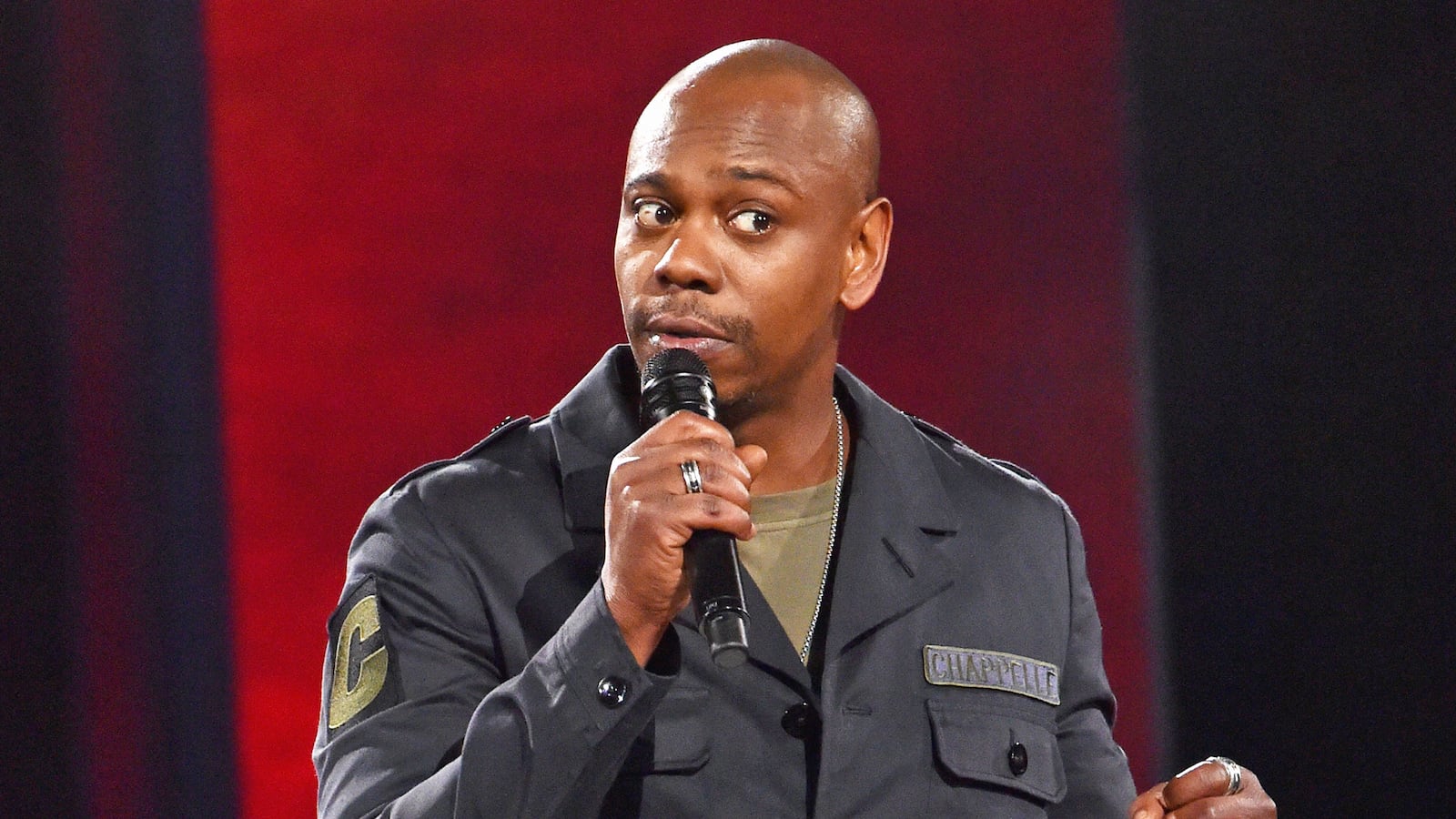Dave Chappelle laughs at his own jokes on stage. Some people consider it hacky but I always found it endearing: Chappelle smiling that toothy grin, hunched over and slapping the microphone on the top of his leg to reaffirm a punch line. He does it more than a dozen times in his new Netflix comedy specials, The Age of Spin: Dave Chappelle Live at the Hollywood Palladium and Deep in the Heart of Texas: Live at Austin City Limits (recorded in 2016 and 2015, respectively)—a hopeful sign for a performer newly comfortable and confident with his material and the spotlight he once shunned.
Fame does weird things to artists. (Or, as Jamie Foxx once bluntly put it, “fame fucks you up.”) Few understand that relationship better than Chappelle, who’s made a career toeing the line between sharp racial humor and the global audience it’s been known to attract. It’s a paradox he’s been touching on for more than 20 years.
On HBO Comedy Half-Hour, in 1998, he told the audience, “I’m nervous. Not about this special. I hope this shit don’t make me famous. You dig? I don’t want to be famous-famous. I want people to like me for who I am.” Six years later, he would riff on the downfalls of fame again, citing Michael Jackson’s post-trial SUV dance as a cautionary tale for black performers. “I don’t trip off being a celebrity,” he told the sold-out Fillmore Auditorium in San Francisco. “One minute they all love you, the next thing you know you’re in front of that courthouse dancing on top of a car trying to figure out what the fuck happened to you.”
The audience took it as a joke but I wonder if Chappelle sensed something on the horizon: a scenario that would force him to jet before a dancing-on-the-car moment could even take place. A year later, he would turn down a $50 million deal from Comedy Central, leading to outlandish (and since-debunked) press stories about him smoking crack and fleeing to Africa because he couldn’t handle the pressure. In truth, he was fearful of placing his racially charged humor in the hands of an ignorant (white) audience, and potentially losing creative control. When your work suddenly, shockingly begins to exist outside your comfort zone, it’s time to make moves.
But Hollywood loves a good comeback story, and this year the baton has been passed to Chappelle, who got the last laugh in that Comedy Central feud by signing a $60 million deal with Netflix. It’s been 13 years since we last saw a televised Chappelle stand-up—and 12 since he left the acclaimed show that turned him into a household name. Now he’s back riffing on the things he’s best known for: sex, weed, music, O.J. Simpson. He also touches on more current affairs, like transgendered individuals. You can feel some of the audience recoil when he goes on an extended riff about Caitlyn Jenner. Considering we now have, as Chappelle said in his SNL monologue last November, “ an internet troll as our president,” that kind of language is more pointed than usual. But it feels crudely ignorant rather than malicious.
Then there’s the focus on racial disparity, a topic Chappelle has come back to repeatedly throughout his career, starting with his 1993 appearance on Star Search. “I was just on Black Entertainment Television—I kind of have a feeling most of you haven’t seen that,” said a then-scrawny 19-year-old Chappelle, in baggy jeans and T-shirt, to the predominantly white audience. The joke received plenty of nervous laughter, but was enough to get him to the second round, where host Ed McMahon once again introduced “Dave Ch-AH-pelle” as “the youngest comedian to ever appear” on the show.

Chappelle isn’t deliberately calling back to old material in these new Netflix specials, but it’s easy to see a through line, one that feels both new and old, unique and nostalgic. The big difference is how he injects his life as a black celebrity into his stand-up routine. Instead of avoiding it, he’s taking it head-on, which is new territory for a comedian who typically turned his gaze elsewhere.
But it’s hard to not watch these specials and think how Chappelle’s success narrative came at the expense of people thinking he went “crazy” back in 2005, which felt like it had more to do with race than any creative decision. Chappelle may be a comedy legend, but he’s also a black comedian who shapes his jokes around the complicated humorous scenarios and relationships that occur in the black community. As James Lipton told Chappelle on an episode of Inside the Actor’s Studio, black comedians “provide insights into black life and black thinking that would quite simply not occur to the white members of the audience.”
Chappelle knew that before, of course. The only difference now is he seems to be taking that responsibility to heart. As he told CBS’s Gayle King in a recent interview, “Comedy is weird. The line moves. It changes. But I think especially in comedy a lot of it has to do with intent.”
“Your intent is?” asked King.
“To make people laugh, to reconcile paradox. I might just openly vent. I think when you get to a certain altitude, there’s more scrutiny over the things you say because the platform is so powerful.”





